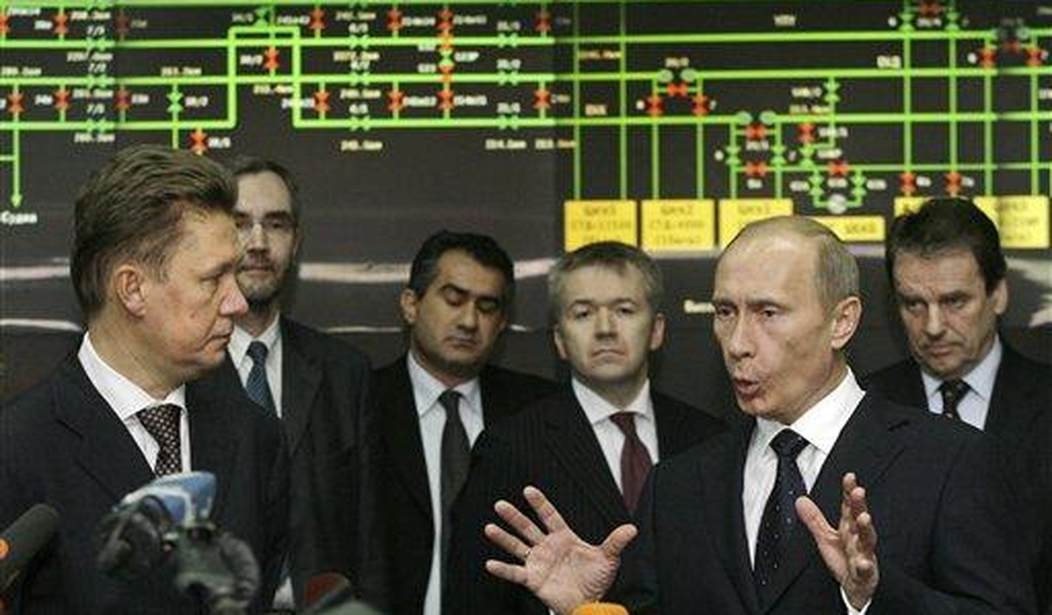As I pointed out yesterday, Russia has cut the supply of natural gas to Germany by about 60% in just a few days. The official reason for this is a technical problem exacerbated by sanctions. Specifically, a turbine used to compress natural gas into a pipeline to Germany was scheduled for repair. The turbine could only be repaired at a special facility located in Canada. But a problem arose because Canada has sanctions in place against the Russia’s state-owned gas company Gazprom. So once the turbine arrived in Canada there was no way to return it Russia.
The claims about the turbine and the sanctions are true but Germany’s Vice Chancellor Robert Habeck clearly didn’t buy the whole story. He said the repairs on the pipeline weren’t scheduled to take place until this fall. “So I also have the impression that what happened yesterday is a political decision, and not a decision that is technically justifiable,” he said.
The demand for gas is relatively low in Germany right now because it’s mostly used for heating in the winter and, this week, there happens to be a heat wave moving in. The main concern was refilling it’s reserve capacity prior to winter when millions of homes will depend on it. Today, Habeck called on Germans to conserve gas to help ensure they have enough for winter.
“The time to do this has arrived,” Robert Habeck, Germany’s economy minister, said in an urgent public appeal posted to Instagram late Wednesday. “Every kilowatt-hour helps in this situation.”
Mr. Habeck said the situation was serious, but insisted that supplies to Europe’s largest economy were assured. But the head of the country’s federal agency for monitoring gas and power networks warned that if Gazprom, Russia’s state-owned energy giant, continued to curtail gas flows, the situation could become more dangerous once temperatures drop.
…if Russia were to continue delivering 40 percent of previous gas flows over the course of several weeks, that could worsen, said Klaus Müller, who heads Germany’s federal agency responsible for gas, electricity and telecommunications.
“It is imperative that we fill the storage facilities now to get through the winter,” Mr. Müller told the Rheinische Post.
It’s pretty clear what is happening here. Just as German Chancellor is in Kyiv this weeks for talks with Ukrainian leader Volodymyr Zelensky, Russia is sending a message about the bad things that could happen this winter if Germany isn’t careful. Indeed, there was a warning today that the situation could get worse.
Russia’s envoy to the EU, Vladimir Chizhov, warned on Thursday that further problems with the repairs could lead to a complete shutdown of the pipeline, with devastating consequences for Germany.
“One should be asking Siemens why they had to send turbines to Canada for repairs,” Chizhov told Ria Novosti news agency. “When all those turbines go to Canada for maintenance, it could stop. I think it will be a catastrophe for Germany.”
Gazprom’s chair Alexei Miller said on Thursday there was “no solution” to the problem with Nord Stream’s turbines as the Canadian plant is the only one that can repair the Siemens Energy turbines…
Miller said rising gas prices had offset the blow of a double-digit decrease in Gazprom’s exports to Europe and Turkey. “Prices have grown . . . several times. So excuse me but if I said we are not mad at anyone, I wouldn’t be lying.”
Russia is always lying. In this case, there’s no reason to take those turbines, which have been running for 10 years, offline now except to rattle Germany. And given Chancellor Olaf Scholz’ history of tenuous action regarding Russia, it just might work.
Last month Vox published this video explaining how Germany became so dependent on Russian gas. It’s a pretty good primer of how we got here. Of course this doesn’t mention another factor which is that while Germany was becoming more depending on Russian gas it was also eliminating nuclear power. The three nuclear plants that were shut down last December could have been used to generate a lot of electricity which could in turn be used to heat a lot of homes this winter. Keeping those power plants wouldn’t solve the problem of a sudden reduction in gas supplies but it would have made the potential crisis less acute.








Join the conversation as a VIP Member